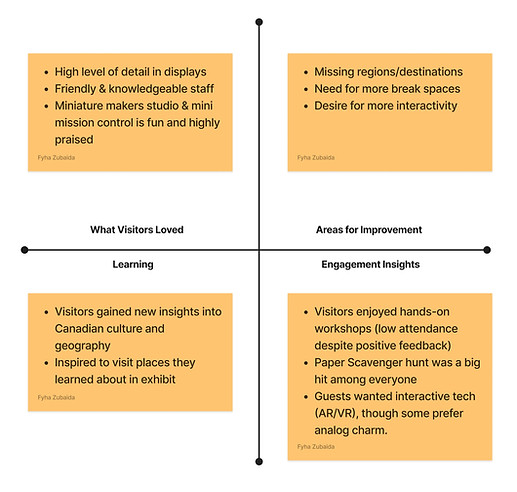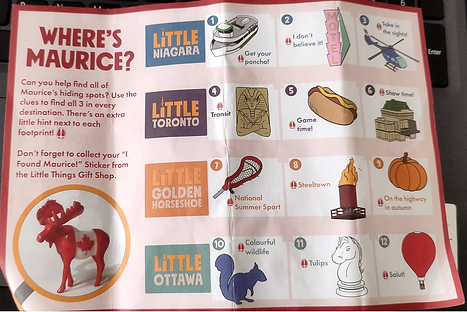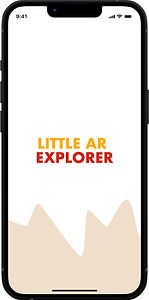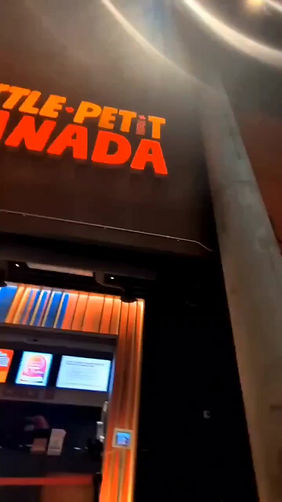Little AR Explorer
An immersive redesign that turns an underused space into a digital scavenger hunt — merging storytelling, cultural education, and the magic of augmented reality.



Who is Little Canada?
Little Canada is a unique and highly detailed miniature world that celebrates the sights, stories, and spirit of Canada. As part of a real-world academic collaboration, our team was invited to rethink an underutilized area of the exhibit and propose a concept for public education and experiential learning.
Role: Immersive Experience Designer
Client: Little Canada
Type: Academic + Real-World Client Project
Timeline: 6 Months
Team: 3 Members




The Problem Brief
How might we design an experience for better public education and experiential learning for Little Canada?
During our initial site visits, we conducted observational research to better understand how visitors interacted with the space. We were completely drawn in by the charm and craftsmanship of the exhibits but we noticed a clear pattern: Many guests would briefly admire the displays, take a few photos, and move on. The experience often remained passive, with limited opportunities for deeper engagement or discovery.
We identified a clear gap : A lack of interactive, educational, and tech-enabled experiences that could enrich the visit and invite more meaningful exploration.

What if there was more than just looking?
What if every corner, every tiny street, had a story waiting to be discovered?
"Beautiful models, but not very engaging!"
We focused on families, kids, and school groups - visitors looking for fun, not complexity.
Through our observations and interviews, we uncovered key user needs:
-
No app downloads — quick, browser-based access
-
Simple to understand — minimal instructions
-
Fun and rewarding — like a game, not a task
-
Culturally rich — they want to learn, but through play

Vistor Journey Map: Existing Experience
This journey map illustrates the current experience of visitors at Little Canada, highlighting key touchpoints, actions, and emotional responses throughout their visit. It captures where visitors engage, pause, or encounter challenges, providing insights into opportunities for enhancing engagement, storytelling, and interactivity.

Core Values: "What mattered to us!"
With our users and the problem in mind, we knew our solution had to be more than just clever — it had to be meaningful.
So we defined three core values to guide every step of our design:
-
Fun: because we wanted it to feel like play, not a task.
-
Cultural Showcase: because Little Canada is full of Canadian stories worth telling.
-
Lasting Experience: because we wanted something memorable, something that stays with you.

Ideations and Exploration!

We studied what was already working!
Little Canada’s popular “Maurice the Moose” scavenger hunt, where kids search for hidden moose figurines throughout the exhibits.
That insight sparked our approach:
People enjoy a Sense of Discovery.
How might we create a simple, playful experience that encourages visitors to slow down, look closer, and connect more deeply with the stories behind the miniatures — without disrupting the magic of the exhibit?

Design System.
To keep the experience consistent with the exhibit, we built our design system using Little Canada’s official typography and color palette. We created a set of mobile-friendly components, simple icons, and layout guidelines designed for quick, on-the-go use inside the space. The result was a clean, accessible interface that felt like a natural extension of the Little Canada brand.

Core Values: “What Mattered to Us”
With our users and the problem in mind, we knew our solution had to be more than just clever; it had to be meaningful. It starts with fun through playful AR interactions, unfolds into a cultural showcase where visitors discover hidden Canadian stories, and ends in a learning experience, one that leaves visitors with meaningful memories.

We filled whiteboards, made pen-and-paper sketches, revisited our values again and again, always asking:
"Can this be playful and educational, without making people stare at their phones the entire time?"

Final Concept.
A web-based AR scavenger hunt that lets visitors explore Little Canada using their smartphones. By following clues and scanning miniature landscapes, they uncover hidden landmarks, animations, and educational content.
We created a mobile-first high-fidelity prototype in Figma that brings the full experience of Little AR Explorer to life — from scanning the QR code to unlocking cultural stories through AR animations. The UI is designed to be playful, accessible, and consistent with Little Canada's brand identity.

Visitors launch the experience with a quick scan — no app required.




Onboarding screens outline the rules and set the tone for playful discovery.



Scan a clue, search the miniature world, and find the match to unlock a playful AR surprise.

Correct matches reveal an AR story or trivia moment.
Bringing AR Explorer to Life.
Here’s a glimpse of Little AR Explorer in action.
Visitors start by scanning a QR code at the very first exhibit and receive their first clue. From there, they look closely at the miniature to find the matching detail and snap a photo to check their answer. When the match is right, a playful AR animation springs to life, sharing fun facts and hidden stories. Visitors can take their time exploring each exhibit before moving on, making the experience feel natural, fun, and full of discovery. This playful, easy-to-use experience encourages visitors to slow down, explore carefully, and discover the magic behind every miniature corner.
